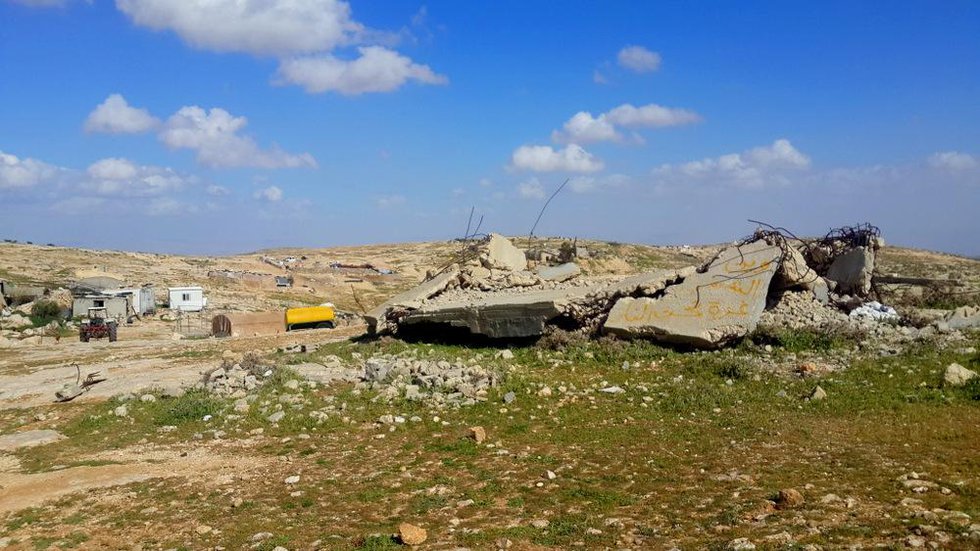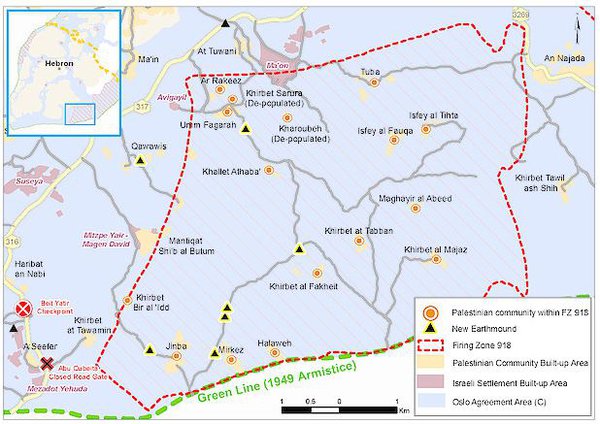
Ruins of Khirbet Mufaqarah mosque, demolished on the grounds that it was not issued a building permit, March 2016. (B’Tselem, CC BY-SA 4.0)
A recent trial of an attack by an Israeli settler on a U.S. citizen shows how difficult it is to obtain justice.
SAM STEIN, THE PROGRESSIVE, OCTOBER 2, 2023
Last March, Cassandra Auren Dixon, a sixty-four-year-old carpenter from Wisconsin, was attacked by Israeli settlers while visiting Masafer Yatta in the West Bank of Palestine. Dixon and another international activist, who has asked to remain anonymous, were near the village of Tuba, which has long been the target of settler attacks. As someone who has spent time in Tuba, I was disturbed but unsurprised to hear about this incident.
“We saw four settlers running from the outpost to the hills,” she told The Progressive. “One of them chased the person I was with . . . the settler had an iron bar that was sharpened [on] one end . . . . Then one of them came up behind me and hit me in the back of the head.” Dixon’s colleague captured the attack on video.
Continue:
The Israeli army is currently attempting to evict the families of Masafer Yatta who live in what Israel has declared “Firing Zone 918.” Attacks similar to Dixon’s are commonplace, and it is not unheard of for the victims themselves to face arrest.
Though the other activist decided not to press charges, Dixon filed a complaint. Dixon’s Lawyer, who is an employee of the Human Rights Defenders Fund, told The Progressive that an initial trial led to Dixon’s attacker, Dovid Weinstock, being placed under house arrest. While Weinstock was residing in Havat Ma’on at the time of the attack, his house arrest is being served at his parent’s home in the illegal settlement of Shilo.
Dixon was not allowed to have her attorney present during the hearings, which were conducted in Hebrew, a language she does not understand.
Dixon’s second court hearing was scheduled for September 6, months after she had returned to her home in Wisconsin. Dixon told The Progressive that between medical fees, time off from her work as a carpenter due to her injuries, and airfare, she has suffered financial losses from both the attack and the extended legal proceedings.
Dixon was not allowed to have her attorney present during the hearings, which were conducted in Hebrew, a language she does not understand. “I know only what the doctors were able to tell me about their testimony, and what the prosecutor told me during a few minutes of conversation,” she said.
Cassandra Dixon (Photo provided)
In an interview with The Progressive, Dixon stated that Weinstock’s lawyers “refused to accept written hospital reports” and claimed that her injuries were not serious. They requested to release him from house arrest, but Dixon’s lawyer told The Progressive that this request was denied.
While a large majority of cases regarding Israeli settler attacks do not result in a conviction, Dixon decided to press charges and pursue legal action out of principle. She hopes the trial can raise awareness of the political reality in the West Bank and of Palestinian life under Israeli occupation. Dixon informed The Progressive she had a desire to “stick it out and stand in solidarity with the people of Tuba and Masafer Yatta.”
After the proceedings, the court scheduled another hearing on November 2 to hear testimony from Weinstock, after which the judge will issue a verdict.
Dixon’s story highlights that while Israeli civilians are often the ones carrying out physical violence, they are protected and reinforced by the state. After speaking with her, I couldn’t help but think of my own experience in August of this year.
When accompanying Palestinian shepherds in the West Bank, a strange man walking towards you is never a good sign. So when another activist and I were in this position in Masafer Yatta, not far from where Dixon was attacked, we were suspicious.
The man claimed that he’d heard about the region in the news, and he simply wanted to see what was going on. Masafer Yatta, a rural area, is not the sort of place curious travelers simply stumble upon. Because we were already suspicious, we ignored him, but he continued. Any possibility that he might be some clueless but harmless bystander would disappear once he followed us—even after we began leaving the area. The shepherd finished grazing his flock and we began walking towards his village, but the stranger insisted on joining us at the shepherd’s home “for tea and coffee.”
At this point, he asked me, “Sam, where are we going?” I had not told him my name. I kept ignoring him, and he began to check some sort of database on his phone while muttering to himself, “Does he speak Hebrew . . . I know he speaks a little . . . Ah, here. English.”
The man was soon joined by two more, and an activist based in Jerusalem texted us letting us know that all three of them either worked for or volunteered for the far-right NGO, Im Tirtzu. Im Tirtzu is an organization that harasses liberal and left-wing activists. After the Facebook page, “Im Tirtzu is a fascist movement” criticized the far-right organization, Im Tirtzu sued them for libel. After hearing the case, a Jerusalem court ruled that Im Tirtzu exhibits enough characteristics of fascism that it isn’t libelous to call them fascist.
The first man who had approached us soon realized that I could understand the Hebrew he was speaking, and said, “You understand every word, that’s what’s most important.” When I showed my ID to a police officer who eventually arrived, the stranger made note of the fact that I have Israeli citizenship. I can only assume this information has since been added to their database.
After three soldiers and a police officer arrived, The other two men with him joined in on harassing me, making a show of mentioning specific information about me, such as my hometown and the fact that I was raised Orthodox Jewish. One accused me of fabricating settler violence and asked me if I’d ever “seen it with [my] own eyes.” He chose to take my silence as some sort of admission of guilt, even though I’ve written extensively about my experiences with settler violence, and have shared videos of settlers throwing rocks at me. The third man told me that “you guys [leftists] are going to go extinct in a few years” and “if [activism] is a business, then. . . you’re on the wrong side.”
While the police ordered both groups to not engage with one another, they made zero attempts to stop Im Tirtzu’s harassment once they didn’t comply, and they ignored our requests for help.
The use of my personal information was clearly a scare tactic.
The use of my personal information was clearly a scare tactic. All of the information they had on me can be found on Google. My social media platforms are all public. The people in Im Tirtzu think that creating the feeling that they’re watching will be enough to make me stop standing in solidarity with Palestinians.
Im Tirtzu has levied attacks on the heads of left-wing NGOs such as The Public Committee Against Torture in Israel, Breaking the Silence, B’Tselem, and Hamoked: The Center for the Defense of the Individual. They were a leading actor in a smear campaign against activists Ezra Nawi, Guy Butavia, and Nasser Nawajah. They were also part of the mass harassment campaign that caused the former director of Breaking the Silence, Yuli Novack, to leave the country. They host an entire website that is simply a list of people they deem to be “destroyers of Israel.” The website contains information compiled by the far-right NGO Ad Kan, which refers to itself as “The Israeli undercover organization exposing Anti-Zionist actors.” Ad Kan has boasted about working and communicating with the Israeli police.
Im Tirtzu’s attacks on me did not let up after that day. They live-streamed the incident on their Facebook page, and clips from those videos have been published on YouTube as well. They dedicated a page to me on their website. It’s titled “Meet the Anarchist: Sam Stein,” and it features a video from my confrontation with the group in Masafer Yatta.
The web page’s headline states “Anarchists claim that there is settler violence against Palestinian shepherds, but in practice, when asked if they have seen violence with their own eyes, they remain silent. Why? Because there is no violence! They just come to incite the area and cause conflict between Jews and Arabs. Shame.” The page has more than 25,000 views.
Organizations like Im Tirtzu are the reason that documentation activism is so important. They attempt to erase the oppression Palestinians suffer and to push a delusional version of the role left-wing activists play. We must make sure that the reality is impossible for anyone to ignore.
Research has consistently shown that there are rarely legal consequences for settler violence. An indictment is more likely, however, if the victim is not Palestinian. According to data from the non-profit Yesh Din “Israeli law enforcement agencies are 2.5 times more likely to indict Israelis who harm non-Palestinians [Israeli security personnel and others] in the West Bank than Israelis who harm Palestinians.”
Incidents of Israeli settler and military violence against non-Palestinians or Palestinians with American citizenship have generally received more media attention than attacks against Palestinians. President Joe Biden made official statements regarding the killings of seventy-eight-year-old Palestinian-American Omar Assad and journalist Shireen Abu Akleh. The U.S. State Department made an official statement condemning a pogrom in the Palestinian town of Turmus’ayya and saying that they expect the Israeli government to prosecute those responsible. Roughly 80 percent of Turmus’ayya residents hold American citizenship.
Both Dixon’s experience and my own are elevated simply because we are both white. But as solidarity activists, it is our job to make sure that those who hear of our experiences pay more attention to the violence and oppression that Palestinians face on a daily basis.
Palestinians do not have the option of simply disengaging from the violence around them.
Though their methods may be different, both Im Tirtzu and Dovid Weinstock aim to keep activists out of the West Bank. In the case of Dixon’s assault, the legal system did little to help her or provide justice. In my case, police and soldiers allowed the political harassment happening in front of their eyes to continue.
These cases prove why activists engaging in solidarity work is needed. Palestinians do not have the option of simply disengaging from the violence around them.
We have an obligation to stand firm in our solidarity. Internationally, that means demanding justice for Palestinian victims of violence even if they don’t enjoy American citizenship. For Israelis and others living in the region, that means creating a culture in which harassing left-wing activists is neither acceptable nor effective and demanding that the perpetrators of settler violence face consequences for their actions.
Sam Stein
Sam Stein is a Jewish-American activist based in Jerusalem. For more, follow him on Instagram and Twitter @sam_avraham


Leave a Reply
You must be logged in to post a comment.